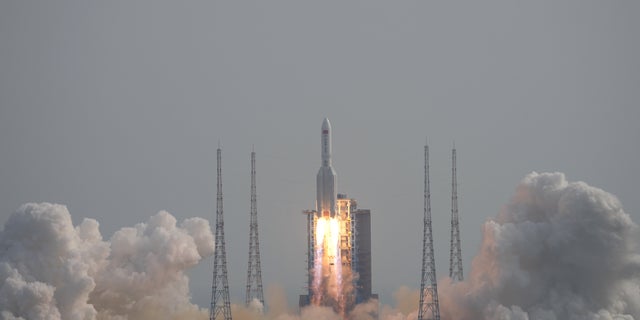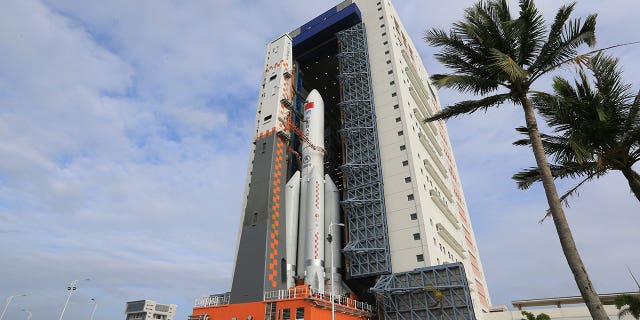The U.S. Space Force this week detected a Chinese reusable spaceplane releasing an object in orbit, officials revealed Friday.
China launched its experimental reusable rocket on Aug. 4 and kept it in orbit for 90 days. U.S. officials revealed that space tracking data identified a second object in a similar orbit to the Chinese craft — the nature of which remains unknown.
The U.S. Space Force’s 18th Space Defense Squadron determined the object is likely in “very close” proximity to the Chinese craft at a distance of less than 200 meters, according to Orbital Focus. The object may have separated out in the week prior to its detection on Monday.
Additionally, the Chinese released no information or statement on the mission since its initial launch, Space News reported. How long the vessel will remain in orbit is also unknown.
CHINA LAUNCHES THIRD AND FINAL SPACE MODULE TO COMPLETE SPACE STATION
The U.S. government regularly struggles to identify flying objects: The Office of the Director of National Intelligence was only able to close out half of the 366 unidentified flying object sightings recorded in 2021.

A Long March-5B Y4 rocket, carrying the Mengtian lab module for China’s under-construction space station Tiangong, takes off from Wenchang Spacecraft Launch Site in Hainan province, China, on Monday.
(China Daily via Reuters)
However, Daily Mail senior reporter Josh Boswell told Tucker Carlson that a good portion of those unexplained cases may end up being Chinese drones.
“The unexplained ones they just have no clue, because these things are moving in ways that we just don’t understand,” Boswell said, citing government sources. “At hypersonic speeds, and then they just turn on a dime. I mean, it’s incredible.”

U.S. Air Force Space Command Vice Commander Lt. Gen. David Thompson, left, and retired Air Force Col. Pamela Melroy testify before the Senate Aviation and Space Subcommittee in the Dirksen Senate Office Building on Capitol Hill in Washington, D.C., on May 14, 2019.
( Chip Somodevilla/Getty Images)
China’s space technology advancement has concerned U.S. officials, with Gen. David Thompson of the Space Force saying during last year’s Halifax International Security Forum that the “threats are really growing and expanding every single day.”
RUSSIA LAUNCHES ROCKET WITH MILITARY SATELLITE, UN LOOKS TO BLOCK SPACE ARMS RACE
“It’s really an evolution of activity that’s been happening for a long time,” Thompson said. “We’re really at a point now where there’s a whole host of ways that our space systems can be threatened.”

China’s space station lab module Mengtian and the rocket Long March-5B Y4 is transported to the launch area at the Wenchang Satellite Launch Center in south China’s Hainan Province on Oct. 25, 2022.
(Tu Haichao/Xinhua via AP)
Thompson had discussed an unspecified number of attacks on U.S. space-based assets that resulted in “reversible” damage but could grow more significant in the coming years.
The experimental vessel and the mysterious second object may be related to the development of an orbital segment of a fully reusable two-stage-to-orbit space transport system, which received national funding from the Natural Science Foundation of China.
CLICK HERE TO GET THE FOX NEWS APP
However, China still has some kinks to work out in its new systems: A 21-ton Chinese rocket that was expected to crash near Spain instead ended up crashing off the coast of Mexico. Authorities in both countries had to close airports and scramble respective Air Force units to track and contain any potential damage, according to outlet AS.
Center for Astrophysics astronomer Jonathan McDowell likened the uncontrolled re-entry to China rolling dice and called the move “irresponsible.”